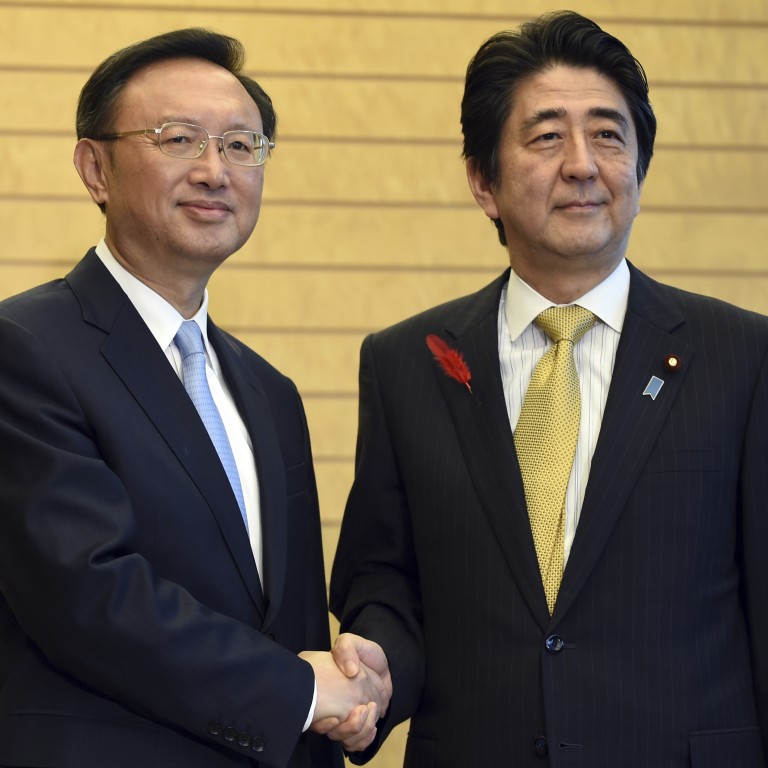
Let's move on from past, says Shinzo Abe as China and Japan agree on system to avoid East China Sea clashes
Set aside ‘unfortunate history’, Japanese PM tells China’s top diplomat as they pave way to summit
Japanese Prime Minister Shinzo Abe called for high-level dialogue with his Chinese counterparts as he told a top diplomat from Beijing that China should move on from “unfortunate past history”.
As State Councillor Yang Jiechi yesterday concluded a two-day visit to Japan, the two neighbours agreed to launch a crisis management mechanism to prevent unintended clashes in the East China Sea as soon as possible.
Yang’s trip followed recent hiccups in historical and maritime territorial disputes that had frayed the slowly improving relationship between the countries.
The visit is also seen as paving the way for a three-way summit between leaders from the two countries and South Korea later this month or early next month.
In the meeting yesterday, Abe expressed regret over China’s successful bid to register the Nanking massacre documents with Unesco.
“I believe we should not excessively focus on our unfortunate past history, but that we should build future-oriented Japan-China relations,” Abe told Yang, China’s top foreign policy official who outranks the foreign minister, according to a senior Japanese official.
Relations between the two countries have been slowly improving since a rare summit between Abe and President Xi Jinping in November. But tensions flared again in recent months over a litany of issues ranging from the Unesco listing to Japan’s passage of a security bill that could boost its military’s footprint overseas.
Despite the irritants, Abe called for more high-level dialogues, in particular with Xi and Premier Li Keqiang on the sidelines of two regional summits next month.
Li is expected to meet Abe and South Korean President Park Geun-hye at the anticipated three-way summit.
Abe and Yang agreed to launch the crisis management mechanism – consisting of hotlines and regular consultations – as soon as possible.
Yang expressed confidence in the trilateral summit, but called on Japan to properly handle historical and military issues, Xinhua reported.
Negotiations on the mechanism had recently ground to a halt due to differences over whether the system should apply to the territorial waters around, and the sky above, a disputed island chain, which China calls the Diaoyus and Japan the Senkakus.
The two neighbours have long feuded over Japan’s wartime atrocities and the islands, which are currently administered by Japan. Rising nationalism in both countries has made it difficult for either government to scale down the tensions.
In a move to temper public sentiment, Chinese state-run tabloid Global Times yesterday ran an editorial calling on civil groups to leave the task of managing bilateral ties to diplomats.
The editorial also suggested that the public refrain from 8harbouring “hatred” for their neighbour.
“China doesn’t need an aggressive approach to show a grave and dignified bearing, because sticking to its own pace in development is enough to be awe-inspiring,” it said.
The shifting tone underscored Beijing’s realisation that an abrasive approach towards Japan would only help, rather than constrain, Abe, said Xie Yanmei, a senior analyst with International Crisis Group.
“What you are seeing is part of a campaign aimed at managing nationalism so there is room for diplomacy to cool tensions 8between the two countries,” Xie said.
Additional reporting by Kyodo
